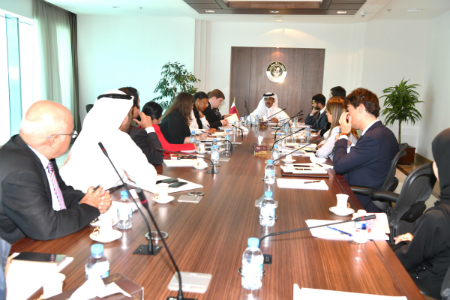Secretary General of Ministry of Foreign Affairs: Qatar Supports Dialogue of Civilizations

Doha / Information Office / September 11
HE Secretary General of the Ministry of Foreign Affairs Ahmed bin Hassan Al-Hammadi has underlined that the State of Qatar pays special attention to the issue of the Alliance of Civilizations, noting that the Qatar National Vision 2030 affirmed the patronage and support of dialogue of civilizations and coexistence among different religions and cultures.
Speaking during his meeting with the United Nations Alliance of Civilizations delegation here today, HE said that "Qatar's support for the dialogue of civilizations, culture of dialogue and conflict resolution is reflected in its successful initiatives to resolve disputes and mediation in several issues, including the Darfur issue, the case of the Bulgarian nurses during the period of Gaddafi in Libya, the transfer of Catholic hostages in Syria to Lebanon, the mediation between Eritrea and Djibouti and other diplomatic mediation efforts of the State of Qatar. ", he added.
HE Dr. Al Hammadi referred to the message of the Qatari Committee of the Alliance of Civilizations, which was established in 2010, to enhance the role of the State of Qatar in highlighting the contribution of Islamic civilization, as well as its role in promoting dialogue, resolving conflicts , emphasizing the values of tolerance, solidarity and peace, and sharing experiences and benefits among peoples on the basis of the values of justice, justice and equality in order to achieve the lofty goals of human society.
For his part, HE UN Envoy for Humanitarian Affairs Dr. Ahmed bin Mohammed Al Muraikhi met with the visiting UN Alliance of Civilizations delegation .
Al-Muraikhi briefed the delegation on the role of the Humanitarian Envoy in ensuring the strengthening of ties between the United Nations and the States of the region, supporting multilateral efforts for humanitarian response by highlighting humanitarian crises, drawing the attention of Governments and non-governmental organizations to those crises and increasing their participation in the international humanitarian community.
He noted the completion of 35 initiatives during the first six months of 2018, and significant progress in achieving the objectives of the General Strategy for Humanitarian Affairs.
He highlighted his focus on resource mobilization through the activities he had undertaken through two major initiatives represented in the initiative to promote bilateral United Nations engagement with targeted stakeholders and tripartite participation with stakeholders, as well as activities under the Agency's partnership initiatives, building partnerships with the private sector to influence policy and the leadership role of the humanitarian envoy.

